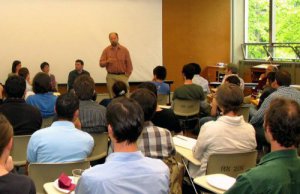 EUGENE, Ore. -- (Oct. 4, 2010) – Hundreds of University of Oregon students are making their first visits to Salem in the coming days to begin work on the Sustainable City Year coursework.
EUGENE, Ore. -- (Oct. 4, 2010) – Hundreds of University of Oregon students are making their first visits to Salem in the coming days to begin work on the Sustainable City Year coursework.
More than 25 courses, 25 faculty members and approximately 600 students will focus on development, planning and civic engagement projects in Salem during the 2010-11 academic year. The contribution of the UO program that integrates research, education, service and public outreach is estimated to be 80,000 hours of work for the city.
In its second year, the UO Sustainable City Year program is expanded in scope to build on its success last year in Gresham where some of the student recommendations are being considered for future development. It also leverages academic strengths at UO including the top-ranked architecture program in sustainable design education.
“Sustainable City projects benefit everyone. Students gain real-world experience working with city officials on important sustainability issues,” said Nico Larco, co-director, UO’s Sustainable Cities Initiative and architecture professor. “The city – Salem this year – benefits from bold ideas that can propel fresh thinking in new directions and improve livability for residents.”
In Salem, projects will involve UO students and faculty from multi-disciplinary areas including architecture; interior architecture; landscape architecture; arts and administration; planning, public policy and management; law; business management; and journalism. A kick-off event in Eugene was held Oct. 1 for Salem officials to meet students and faculty leaders.
A priority project beginning this fall is a strategy for redevelopment of Salem’s north downtown along the waterfront. Four classes – one in architecture design and three in planning – will develop a plan to make better use of the riverfront. The plan will serve as a possible extension to a Downtown Strategic Action Plan scheduled for completion later this fall.
"The SCI work will broaden our thinking and help the community create an exciting vision for this area, which is bordered by our downtown and the river," said Salem City Manager Linda Norris.
The students will also develop a plan to connect Salem’s downtown parks with urban trails and bike routes to improve pedestrian and bicycle accessibility and the enjoyment of the parks. UO is partnering with Portland State University’s civil engineering department on this project for a traffic circulation study. This project ties into another project, which will identify ways to help restore Minto-Brown Island urban park with support from courses in landscape architecture and planning.
“Cities are increasingly interested in how to improve their active transportation systems but struggle with ideas and the political space to make changes,” said Marc Schlossberg, co-director of UO’s Sustainable Cities Initiative and planning professor. “Our classes will address connectivity between downtown and Salem's urban parks as well as site designs of key barriers or conflict points. The partnership with PSU will also look at bicycle and pedestrian systems in addition to vehicular travel.”
Mark Becktel, Salem Parks and Transportation Services manager adds, "This project provides us an opportunity to identify ways to enhance pedestrian and bicycle connectivity to and between our newly developing downtown housing, central Salem parks, Capitol Mall, retail core, historic districts and Willamette University.”
While some projects will be conceptual, others will move forward pressing issues for Salem. A project will develop redesign scenarios for a new police facility and civic center to improve public service. The work may lead to a potential bond measure.
"I am a huge supporter of this project," said Salem Mayor Janet Taylor. "This is an opportunity to address critical needs of the Police Department and to develop a plan to meet City Hall's current and future needs. I can't wait to get started."
Other projects include an industrial ecology class examination of Salem dairy and water processing for reuse of waste products, and a civic engagement strategy to expand communication, representation and participation in decision making with use of new technology and other materials, supported by business management, journalism and arts and administration courses.
Projects were selected because they accelerate positive direction for Salem, fit within curriculum, and will result in fully researched and designed options for the City Council to move Salem forward at the right time.